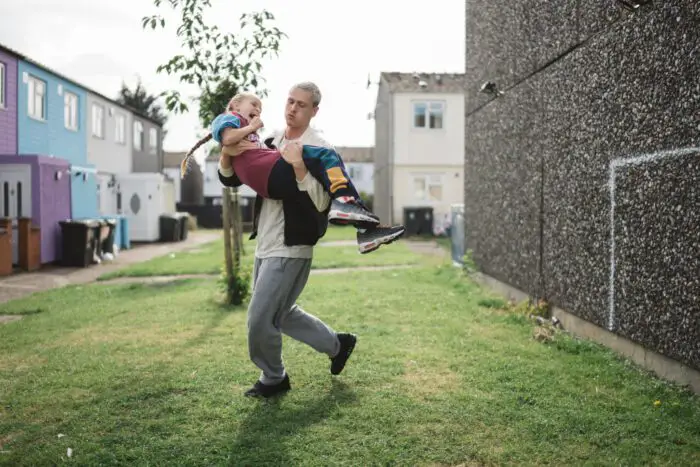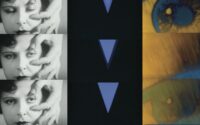There’s a long lineage of combining social-realism with coming-of-age stories. Every decade and locale has its own classics. From The 400 Blows and Kes to more recent examples like This is England, Ratcatcher, and Moonlight, tales of children with their sights set high above their deprived surroundings as their scout about for grown-ups to look up to have made for some of the most iconic and unforgettable narratives in cinema. They are also often quite bleak and tragic affairs, coming of age stories are routinely synonymous with stories of disillusionment and loss of innocence. With her feature film debut Scrapper, Charlotte Regan seeks to challenge that narrative and deliver a coming of age tale that is vibrant, funny and eccentric, bestowing onto her working class protagonists the dignity of a life rich in spirit. Consequently, the issues at the heart of her movie—class, abuse, neglect, abandonment, economic instability, indifferent institutions of care—go somewhat by the wayside, centering instead the slowly developing bond between precocious twelve-year-old Georgie (Lola Campbell) and her absentee father Jason (Harris Dickerson).

As we meet Georgie, she’s been living alone for an indeterminate period of time. Her mother recently passed away, leaving Georgie to fend for herself, which she has been quite happy to do, deceiving social services into thinking she has an uncle looking after her. We see how she maintains this deception but quite how it began is unclear. Did her mother not have a funeral? If so, who arranged it for Georgie, and did they not think to enquire as to her welfare? Did her mum have absolutely no one to call upon during her illness, and if not, why not? Is stealing bike parts and selling them on to a local chop-shop really paying her rent? There may be plausible answers to these questions, but rather than providing any, Scrapper is banking on the viewer simply not asking them.
This is when guardian of last resort Jason enters the picture, fresh off the plane from Ibiza where he’s misspent the last twelve years of non-parenthood. The defiantly independent Georgie is understandably suspicious of this stranger declaring parental responsibility and the two embark on an uneasy, often combative new relationship, with her sole friend Ali (Alin Uzun) occasionally completing a trio. Together, parent and child attempt to build a rapport, test one another’s patience and earn each other’s affection. There’s an undeniable pathos to their situation, however contrived, and the film’s best moments emerge from the credible bonding scenes between Campbell and Dickerson. Both give understated performances, Campbell’s occasionally reminiscent of the particularly spirited lead of an elementary school play, and Dickerson not really bringing much depth or conflict out of his inherently conflicted character. Still, their double act manages to be both amusing and endearing and their wholesome chemistry does about all that’s needed to carry the film.
Regan’s approach to her story feels oddly muddled, at times adopting a magic-realist esprit à la
Lynne Ramsey, at others a more quotidian kind of poetry. One scene walks that knife-edge between pastiche and rip-off as Dickerson recreates the scene from Paris, Texas where absentee father Travis attempts to amuse his child with antics from across the street. Of course there’s a moment where the parent and child retreat to the countryside, and it’s all rather too predictable to feel sincere. More tired still are the often labored attempts at comedy, where the film all of a sudden decides to break the fourth wall or abruptly switch styles for the sake of a one-off gag. Some scenes are contextualized as the active imagination of its prepubescent heroine—though this itself feels out of character as Georgie is remarkably practical and realistic for her age—while others come off as forced attempts to be quirky.
The film to which Scrapper has drawn most frequent and tedious comparisons is Aftersun. I say tedious because the extent of its similarity to that visionary modern masterpiece lies in extremely shallow coincidences: that its protagonists are a father and daughter of similar ages and it is the debut feature of a director named Charlotte _____. Comparing the two is therefore both facile and extremely cruel to Scrapper, a broader and more comic enterprise without anything like that kind of emotional depth and insight. Judged on its own merits, Scrapper is a moderately charming crowd-pleaser, one that paints a colorful picture well within the lines of its genre, and acquires some teary sentiment through the machinations of a less than inspired script. It’s sweet, easy-going and may provide a welcome enough antidote to the darker coming of age stories that inspired it.




